8 Oct 2018 | Campaigns -- Featured, Media Freedom, Statements
[vc_row][vc_column][vc_single_image image=”103114″ img_size=”full” add_caption=”yes”][vc_column_text]Viktoria Marinova, a reporter with TVN in Ruse, Bulgaria, was found brutally murdered on 6 October. The 30-year old was reportedly found dead in a park and had also been the victim of sexual crime.
Index on Censorship is shocked and saddened at the murder of a third journalist in the European Union in the last 12 months, following the killings of Daphne Caruana Galizia in Malta and Jan Kuciak and his partner in Slovakia.
Index’s Mapping Media Freedom project, which monitors threats, limitations and violations of media freedom in 43 countries has received 45 reports concerning Bulgaria since May 2014. There are 36 verified incidents on the platform that include deaths of media professionals since May 2014.
Index and European Centre for Press and Media Freedom (ECPMF) partner organisations recently wrote to Bulgaria’s Prime Minister, urging him to ensure the safety of journalists.
Paula Kennedy, assistant editor, said: “Index urges the Bulgarian authorities to ensure a swift and transparent investigation into the murder of Viktoria Marinova, including clarifying if her murder was connected to her work as a journalist”.[/vc_column_text][vc_raw_html]JTNDaWZyYW1lJTIwd2lkdGglM0QlMjI3MDAlMjIlMjBoZWlnaHQlM0QlMjIzMTUlMjIlMjBzcmMlM0QlMjJodHRwcyUzQSUyRiUyRm1hcHBpbmdtZWRpYWZyZWVkb20udXNoYWhpZGkuaW8lMkZzYXZlZHNlYXJjaGVzJTJGNzUlMkZtYXAlMjIlMjBmcmFtZWJvcmRlciUzRCUyMjAlMjIlMjBhbGxvd2Z1bGxzY3JlZW4lM0UlM0MlMkZpZnJhbWUlM0U=[/vc_raw_html][vc_raw_html]JTNDaWZyYW1lJTIwd2lkdGglM0QlMjI3MDAlMjIlMjBoZWlnaHQlM0QlMjI2MDAlMjIlMjBzcmMlM0QlMjJodHRwcyUzQSUyRiUyRm1hcHBpbmdtZWRpYWZyZWVkb20udXNoYWhpZGkuaW8lMkZzYXZlZHNlYXJjaGVzJTJGNzUlMkZkYXRhJTIyJTIwZnJhbWVib3JkZXIlM0QlMjIwJTIyJTIwYWxsb3dmdWxsc2NyZWVuJTNFJTNDJTJGaWZyYW1lJTNF[/vc_raw_html][/vc_column][/vc_row][vc_row][vc_column][vc_basic_grid post_type=”post” max_items=”4″ element_width=”6″ grid_id=”vc_gid:1538993415308-f6886e9e-16a5-0″ taxonomies=”9044″][/vc_column][/vc_row]
7 Aug 2018 | Magazine, News and features, Volume 47.02 Summer 2018 Extras
[vc_row][vc_column][vc_row_inner][vc_column_inner][vc_video link=”https://www.youtube.com/watch?v=5Rswx2Z7SDw&list=PLBi_wVTZlqjxOK7M028WJ5efw3oslTy4T”][/vc_column_inner][/vc_row_inner][/vc_column][/vc_row][vc_row][vc_column][vc_column_text]
What does paradise mean to you? A pina colada on a white-sand beach? A beautiful sunset over Mayan ruins? The summer 2018 issue of Index on Censorship magazine looks at some of the world’s most popular “paradise” destinations and asks whether their reality quite lives up to their reputation (hint, it doesn’t, especially when it comes to free expression). But criticise these places all you like, the concept of paradise at least, whether lost or found, has been quite the inspiration for a lot of iconic music. Here we pick our top tracks in tribute to the theme. We hope you enjoy listening, sort of.
Holiday by Madonna
Ah Holiday by Madonna, that quintessential going away hit, especially when it first came out in the 80s. This song is pretty syrupy, we’re not going to lie. Madonna calls for everybody to “put [their] trouble down” for a day and celebrate. There’s not really a hint that holiday doesn’t always equal everything being great. But what if you’re a tourist in Baja Mexico Sur, where you might very well see bodies of those involved in the drug trade dangling from bridges, as Stephen Woodman explores in the magazine? Not such a holiday then is it Madge?
Holidays in the Sun by the Sex Pistols
The Sex Pistols actually have experienced a holiday gone wrong, when they went to the island of Jersey and were kicked out. So they switched the sunshine for several weeks in Berlin instead. And this inspired their song Holidays in the Sun, in which they want you to “see some history” and visit “the new Belsen”. It’s basically a really catchy way of arguing for visiting grittier places.
Paradise by Coldplay
Coldplay’s song Paradise is about dreams dashed, in this case that of a girl who grows up in a world that is far from paradise and can only access it through her dreams. It reminds us of the superb short story by contributing editor Kaya Genç, who writes about an elderly man in Turkey who looks back on his life, his expectations for paradise and what became of them.
Cruel Summer by Bananarama
Admittedly this is less about a destination gone bad and more about not being able to go to said destination. There are lines like “My friends are away and I’m on my own.” Summer is cruel because summer is about staying put. But maybe that’s for the best? What’s so great about going to a destination that is tumbling down a free speech index? Just some food for thought Bananarama.
Bad Moon Rising by Creedence Clearwater Revival
At the song’s centre is the moon. The moon! Who hasn’t stared at the starry sky when abroad as a holiday highlight? And yet… it’s a bad moon. The lyrics are nothing short of foreboding; “I see trouble on the way” for example. Despite the downbeat lyrics, the melody remains pretty upbeat. Sort of like being a tourist in Sri Lanka, where you’re surrounded by beautiful sites but also the legacy of war.
Holiday by Dizzee Rascal
Talk about making an offer you can’t refuse – Dizzee Rascal invites the object of his affections away on what sounds like the ideal vacation (or two or three – take your pick from the South of France, Ibiza or Milan). There’ll be champagne and a sun tan. Perfect! But why no mention of Malta or the Maldives or those other beautiful hotspots? Maybe Dizzee ran out of line space or maybe Dizzee circa 2009 foresaw the issues that would affect these areas by 2018.
Buffalo Soldier by Bob Marley
Go to a beach bar in the Caribbean, that ultimate holiday destination, and you’d be hard pressed not to hear Bob Marley. For many a visitor he is the soundtrack of the region. And yet as much as his songs are soothing, they are also very political. Marley was a man who would not gloss over the darker sides of paradise. For this reason, we like to think if he was alive today he would have contributed to our issue. Buffalo Soldier, a reminder of the history of slavery in the USA and the Caribbean, is case in point. Easy to enjoy, until you actually listen to the lyrics.
Holiday by Green Day
Our third and final offering with holiday in the title and yet the only one of the three songs that isn’t in total praise of a vacation. Green Day’s tribute to your time off talks less about nice things and instead looks at US political conservatism under George W. Bush and the Iraq war. The chorus’ line – “This is our lives on holiday” – attacks US apathy. Released in 2005 but certainly still relevant to different areas of the world today.
[/vc_column_text][/vc_column][/vc_row][vc_row content_placement=”top”][vc_column width=”1/3″][vc_custom_heading text=”Trouble in Paradise” font_container=”tag:p|font_size:24|text_align:left” link=”url:https%3A%2F%2Fwww.indexoncensorship.org%2F2018%2F06%2Ftrouble-in-paradise%2F|||”][vc_column_text]The summer 2018 issue of Index on Censorship magazine takes you on holiday, just a different kind of holiday. From Malta to the Maldives, we explore how freedom of expression is under attack in dream destinations around the world.
With: Martin Rowson, Jon Savage, Jonathan Tel [/vc_column_text][/vc_column][vc_column width=”1/3″][vc_single_image image=”100842″ img_size=”medium” alignment=”center” onclick=”custom_link” link=”https://www.indexoncensorship.org/2018/06/trouble-in-paradise/”][/vc_column][vc_column width=”1/3″ css=”.vc_custom_1481888488328{padding-bottom: 50px !important;}”][vc_custom_heading text=”Subscribe” font_container=”tag:p|font_size:24|text_align:left” link=”url:https%3A%2F%2Fwww.indexoncensorship.org%2Fsubscribe%2F|||”][vc_column_text]In print, online. In your mailbox, on your iPad.
Subscription options from £18 or just £1.49 in the App Store for a digital issue.
Every subscriber helps support Index on Censorship’s projects around the world.
 SUBSCRIBE NOW[/vc_column_text][/vc_column][/vc_row]
SUBSCRIBE NOW[/vc_column_text][/vc_column][/vc_row]
5 Jul 2018 | News and features, Volume 47.02 Summer 2018, Volume 47.02 Summer 2018 Extras
[vc_row][vc_column][vc_column_text]
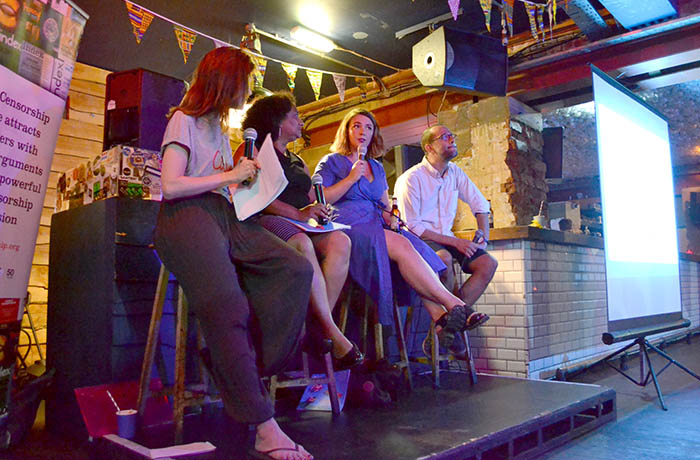
Vicky Baker, Meera Selva, Harriet Fitch Little and Benji Lanyado. Credit: Rosie Gilbey
“I would always err towards saying go rather than don’t go,” said Benji Lanyado, travel writer and founder of picture agency Picfair, speaking at a panel debate to launch the summer 2018 issue of Index on Censorship magazine.
The latest issue of the magazine, Trouble in Paradise, looks at the free speech issues that are prominent in certain top travel destinations, and yet are often overlooked by tourists and the tourist industry. Countries covered included Mexico, Malta, the Philippines and the Maldives. For the launch, a panel of travel writers and editors shared their thoughts on the roles of writers to tell the full story, rather than the nice, PR holiday story, and discussed the free speech implications of travel.
Taking place at The Book Club in Shoreditch, London, Lanyado was joined by former foreign correspondent Meera Selva, and Harriet Fitch Little, a Financial Times writer. The discussion was chaired by Vicky Baker, a journalist at the BBC.
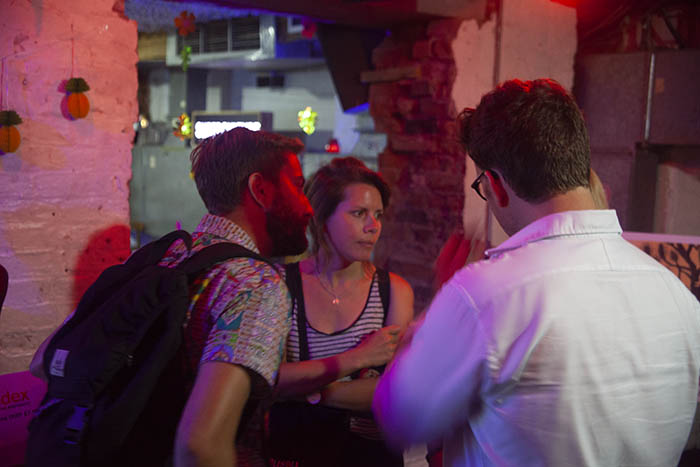
“The best travel writers do weave in the history and the politics of a place,” said Selva, while Fitch Little, talking about travel writing that might be paid for by travel companies or tourist boards as opposed to publications, said “there’s a way to write about a press trip that is fascinating and revealing.”
All panellists agreed on the value of speaking to locals in a destination, though they also acknowledged that doing so was not necessarily on the top of everyone’s holiday priority list, in particular families who might just want a nice break or might not have the budget for more adventurous travel – and that shouldn’t necessarily be condemned. “We all need escapism from time to time,” said Baker.
The panel also discussed whether travel journalists should write about problematic countries at all, raising questions about whether travelling to these places – and encouraging others to travel to them – benefits corrupt regimes.
“The best travel writers don’t just regurgitate the travel documents provided by the government,” Lanyado said.
“Sometimes you can get so obsessed by the pitfalls of a country and the leaders of a country that you forget about the people, and they can be totally different,” he added and asked whether boycotting a country was a form of censorship in its own right.
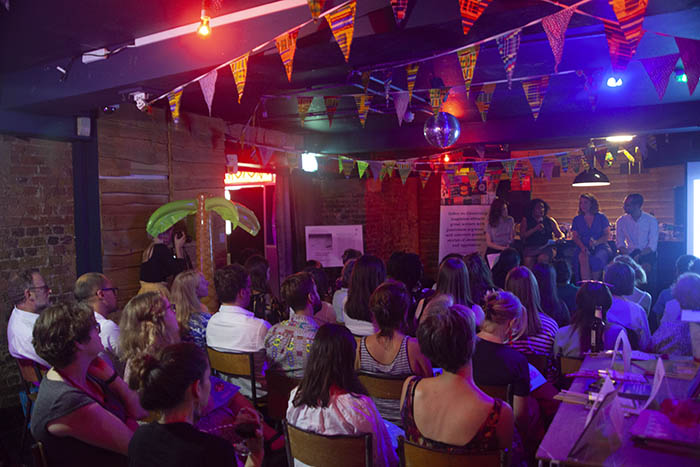
“If you don’t go, you don’t learn about the people,” said Baker.
Selva recalled a story of a travel journalist who went on a press trip to North Korea. While this journalist had first-hand experience of government propaganda, they also saw another side of the country when their bus driver did a detour into the countryside, heading off the beaten track. Had the travel journalist not gone, they would not have been able to report on this side.
The question of “ethical travel” was picked up by an audience member, Tina Urso from Malta, who spoke about Daphne Caruana Galizia, a Maltese journalist who was murdered on 16 October 2017 some 70 metres away from her home. Her death, which remains unsolved, exposed Malta’s dark side. There is now a memorial to Daphne opposite the central law courts in Valletta, the capital.
Urso said how this memorial is constantly dismantled, but that tourists, more so than locals, regularly rebuild it. She therefore saw the presence of tourists in Malta as playing a fundamental – and positive – role in highlighting these free speech abuses.
Finally, Fitch Little, who worked for local press in Lebanon and Cambodia, noted that there can sometimes be pressure coming from the other direction, namely pressure for writers to ham up the darker sides of destinations and that this too can conceal the real truth. She said how when writing about Cambodia, UK media often wanted a particular angle, usually one related to the Khmer Rouge.
Equally, when working for Time Out in Lebanon, her friends back home found it hard to believe that the country could have nice restaurants, for example, having seen the country in a more negative light. “Less sexy stories don’t get told,” she said.
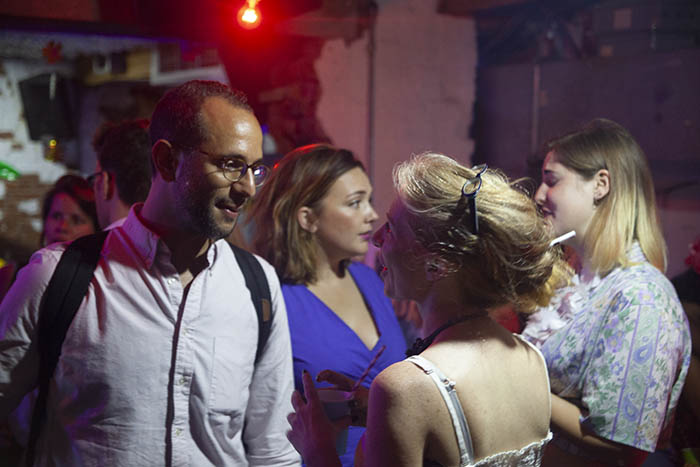
For more information on the summer issue of the magazine, click here. Included in the issue is an article from a Maltese journalist, Caroline Muscat, on corruption in the country, a look at journalists living under protection due to their reporting of the drug wars in Baja California Sur and an interview with Federica Angeli, a journalist who lives under 24-hour police protection following her exposé of the mafia in the pretty Italian seaside resort of Ostia.
[/vc_column_text][/vc_column][/vc_row][vc_row][vc_column width=”1/3″][vc_custom_heading text=”Trouble in Paradise”][vc_column_text]The summer 2018 issue of Index on Censorship magazine takes you on holiday, just a different kind of holiday. From Malta to the Maldives, we explore how freedom of expression is under attack in dream destinations around the world.
With: Martin Rowson, Jon Savage, Jonathan Tel [/vc_column_text][/vc_column][vc_column width=”1/3″][vc_single_image image=”100843″ img_size=”medium”][/vc_column][vc_column width=”1/3″][vc_custom_heading text=”Subscribe”][vc_column_text]In print, online. In your mailbox, on your iPad.
Subscription options from £18 or just £1.49 in the App Store for a digital issue.
Every subscriber helps support Index on Censorship’s projects around the world.
 SUBSCRIBE NOW[/vc_column_text][/vc_column][/vc_row]
SUBSCRIBE NOW[/vc_column_text][/vc_column][/vc_row]
26 Jun 2018 | Magazine, News and features, Press Releases
[vc_row][vc_column][vc_column_text]
— Index special issue finds the dark side of summer holiday destinations not being reported on travel sites
— Editor calls on travel journalists to tell the whole story
— July 4 debate in London’s Book Club
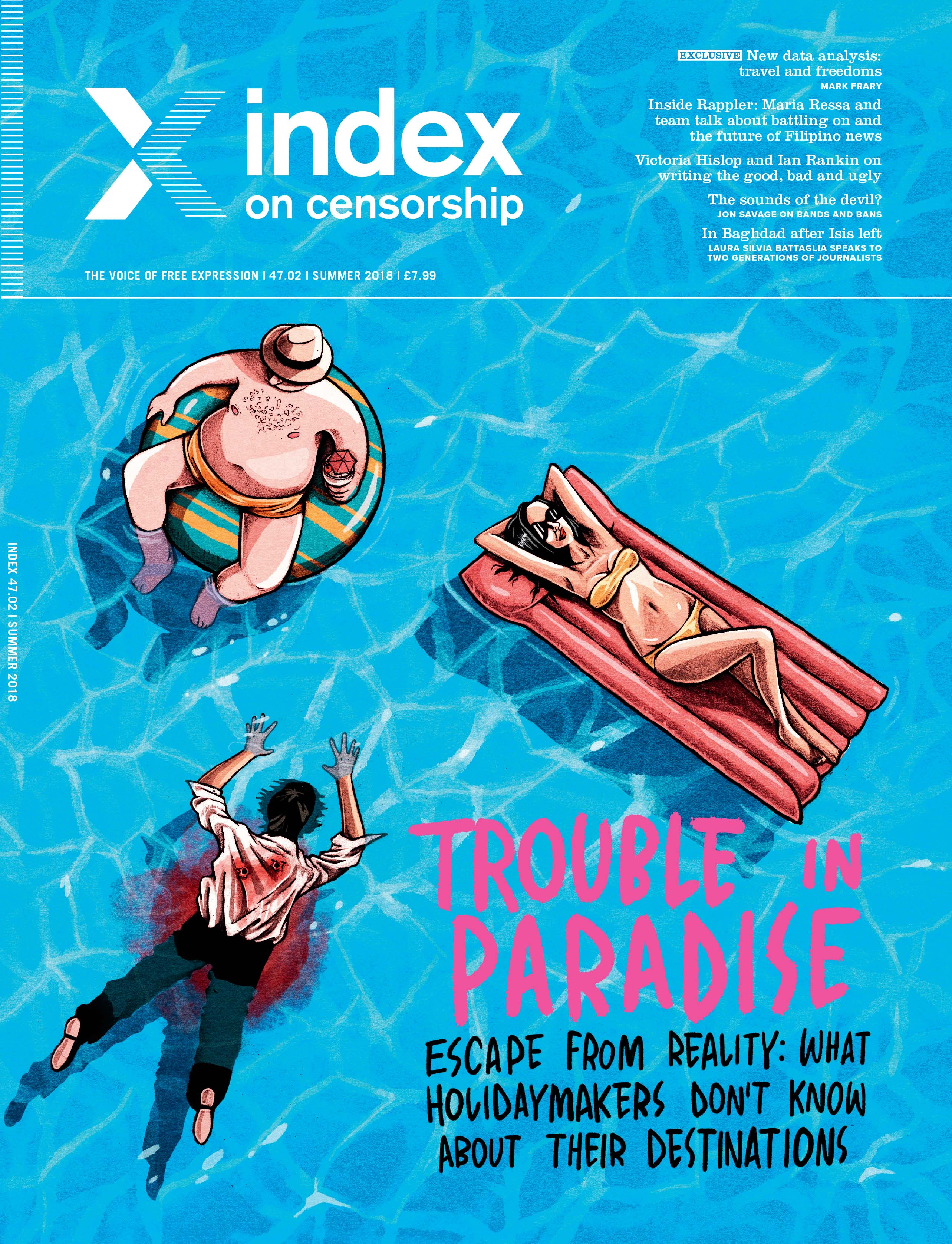 With holidaymakers packing up for their summer trips, a new issue of Index on Censorship magazine reveals the uglier side of countries with tourist appeal and calls on travel writers to do more to give travellers the whole picture.
With holidaymakers packing up for their summer trips, a new issue of Index on Censorship magazine reveals the uglier side of countries with tourist appeal and calls on travel writers to do more to give travellers the whole picture.
Index editor Rachael Jolley said: “On travel websites for popular destinations like Mexico, Maldives and Malta there is little sign of the crackdown on freedoms we are seeing in these nations. From the horrific numbers of journalists being killed in Mexico, to the murder of journalist Daphne Caruana Galizia in Malta, and anti-Muslim riots in Sri Lanka, with worshippers attacked on the way to mosques.
“I would like to see travel journalists do more to tell the whole story. With fewer travellers carrying print travel guides, which traditionally did give more background on political tensions and freedoms, digital versions need to step up to give travellers the full range of information, rather than just the glossy bits.”
“With many countries depending on travel spending as a vital part of their economy, the travel industry can also do more to press for change,” she added.
A discussion on the theme, will take place on 4 July at the Book Club in Shoreditch, chaired by BBC World journalist Vicky Baker. Panellists include former foreign correspondent Meera Selva, founder of the travel picture agency Picfair, Benji Lanyado, and Harriet Fitch Little, who writes for the Financial Times travel section, and formerly worked as a journalist in Lebanon.
Tourism is the main pillar of Mexico’s Baja California Sur’s economy, which is now the setting of some of the fiercest drug battles in the country. Conditions for journalists and human rights activists have deteriorated dramatically, according to the Index report Trouble in Paradise.
The security profile of Baja California Sur has changed enormously, but because it’s a tourist spot the government wants to hide that, Mexico correspondent Stephen Woodman writes in the Index report.
Journalist Federica Angeli, whose exposure of mafia in the pretty seaside town of Ostia, near Rome, has resulted in her having to live under 24-hour police protection. “Ostia is a paradise inhabited by demons,” Angeli told Index.
In Malta, where the recent murder of journalist Daphne Caruana Galizia remains largely unsolved, Maltese journalist Caroline Muscat writes: “Those who mention her name, those who refuse to bow to a society bent by corruption, are insulted and threatened. Journalists and activists keep being reminded of the untold damage they are doing to the country’s reputation.”
Honeymoon destination the Maldives is also covered. The “disappearance” of a journalist, the killing of a blogger, death threats, imprisonment and hefty fines are placing an enormous pressure on those who seek to inform the public about what is going on, writes Zaheena Rasheed.
Just how much do these darker sides affect tourism? New data analysed exclusively for Index looks at the power of tourism spend, and just how valuable tourism is to economies such as Mexico and the Maldives.
Also in the magazine: how journalists’ conditions are deteriorating in Iraq, despite the retreat of Isis, Jon Savage on bands and bans, and Filipino news boss Maria Ressa on keeping going despite government pressure for her news operation to give up, plus a short story on the future of facial recognition by award-winning writer Jonathan Tel.
Editors’ notes:
For media tickets to the debate, email: [email protected]
Index on Censorship magazine was first published in 1972 and remains the only global magazine dedicated to free expression. Since then, some of the greatest names in literature and academia have written for the magazine, including Nadine Gordimer, Mario Vargas Llosa, Amartya Sen, Samuel Beckett, as well as Arthur Miller and Harold Pinter. The magazine continues to attract great writers, passionate arguments, and expose chilling stories of censorship and violence. It is the only global free expression magazine.
Each quarterly magazine is filled with reports, analysis, photography and creative writing from around the world. Index on Censorship magazine is published four times a year by Sage, and is available in print, online and mobile/tablets (iPhone/iPad, Android, Kindle Fire).
Winner of the British Society of Magazine Editors 2016 Editor of the Year in the special interest category.
[/vc_column_text][/vc_column][/vc_row][vc_row content_placement=”top”][vc_column width=”1/3″][vc_custom_heading text=”Trouble in paradise” font_container=”tag:p|font_size:24|text_align:left” link=”url:https%3A%2F%2Fwww.indexoncensorship.org%2F2018%2F06%2Ftrouble-in-paradise%2F|||”][vc_column_text]The summer 2018 issue of Index on Censorship magazine takes a special look at how holidaymakers’ images of palm-fringed beaches and crystal clear waters contrast with the reality of freedoms under threat
With: Ian Rankin, Victoria Hislop, Maria Ressa [/vc_column_text][/vc_column][vc_column width=”1/3″][vc_single_image image=”100776″ img_size=”medium” alignment=”center” onclick=”custom_link” link=”https://www.indexoncensorship.org/2018/06/trouble-in-paradise/”][/vc_column][vc_column width=”1/3″ css=”.vc_custom_1481888488328{padding-bottom: 50px !important;}”][vc_custom_heading text=”Subscribe” font_container=”tag:p|font_size:24|text_align:left” link=”url:https%3A%2F%2Fwww.indexoncensorship.org%2Fsubscribe%2F|||”][vc_column_text]In print, online. In your mailbox, on your iPad.
Subscription options from £18 or just £1.49 in the App Store for a digital issue.
Every subscriber helps support Index on Censorship’s projects around the world.
 SUBSCRIBE NOW[/vc_column_text][/vc_column][/vc_row]
SUBSCRIBE NOW[/vc_column_text][/vc_column][/vc_row]





 With holidaymakers packing up for their summer trips, a new issue of
With holidaymakers packing up for their summer trips, a new issue of